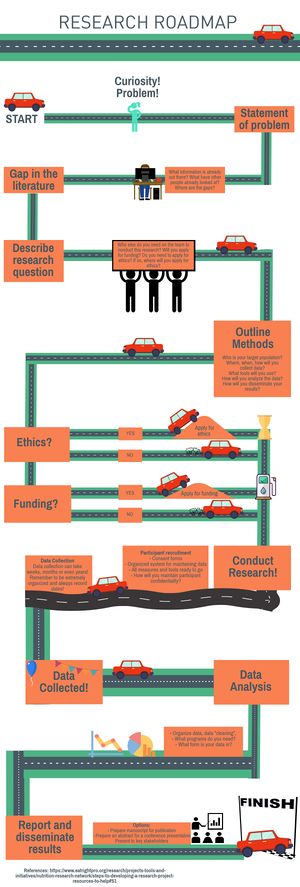Dietetics:ProfessionalPractice/Practice-Based Research 2019
Relevance of practice based research to dietetics student learning
- Research is the foundation on which dietetics practice stands upon
- Research supports core knowledge and standards of care
- Research is important for public policy and understanding communities
Summary of key principles
There are various study designs which may help answer a specific research question
Quantitative designs:
- Randomized controlled trials
- Able to minimize bias
- Can allow for comparison (treatment compared to control)
- May need a high sample size to have adequate statistical power
- Can be expensive in terms of time and money
- Cohort (prospective)
- A type of longitudinal study designed to develop a better understanding of possible risk factors
- Avoids risk of recall bias
- Allows for the calculating of incidence rates
- Risk for losing participants over time
- May need very large sample size
- A type of longitudinal study designed to develop a better understanding of possible risk factors
- Case control studies
- A type of observational study designed to determine of an exposure is associated with an outcome
- Good for studying rare disease conditions
- Good for studying conditions with long lag times between exposure and outcome
- Subject to recall bias
- A type of observational study designed to determine of an exposure is associated with an outcome
- Cross-sectional
- A type of observational study designed to examine the relationship between variables at a single time point
- Inexpensive and relatively quick
- Help to pave the way for future research
- Cannot infer causation
- Potential for non-response bias
- A type of observational study designed to examine the relationship between variables at a single time point
Qualitative designs:
- Ethnographic
- Immersion into target participants' environment to understand the goals, cultures, challenges, motivations etc
- Narrative
- Group of approaches that rely on the written or spoken words of individuals such as interviews, focus groups
- Phenomenological
- Combination of methods to understand the meaning participants place on what is being examined
The research we don't get to hear about!
- PhotoVoice
- Community-based participatory action research
- Use photos and participant dialogue
- Empower people within a community
- Give marginalized populations a voice
- Narrative inquiry
- A way of understanding and inquiring into experiences through a collaborative approach between the researcher and participants
- Research through story telling
- Autoethnography
- Incorporates self-reflection into the research process
- Bring in personal experience and connect to broader cultural, political and social meanings and understandings
The importance of disseminating research and knowledge translation
- Diffusion
- A passive, unplanned, or uncontrolled dissemination, primarily mediated by peers
- Where the potential user seeks out information
- Dissemination
- An active process to communicate results to potential users by targeting, tailoring and packaging the message for a particular target audience
- Examples include conference presentations, publications, summary briefings, educational sessions, media engagement
- An active process to communicate results to potential users by targeting, tailoring and packaging the message for a particular target audience
- Best Methods of Dissemination
- Depends on your message, audience, messenger, and expected outcome
- Dissemination processes should be informed by high-quality context specific evidence, messages should be clear, simple, and action orientated, and dissemination strategies should include a plan to evaluate the the impact of the chosen approach and a way to measure its success
Digital media learning resource #1
This infograph provides an overview of the research process. Although presented as a linear road-map, it is often a very windy road! However, this infograph provides the key components that one typically will need to undergo when conducting a research project.

Digital media learning resource #2
These short videos are interview clips with Claire Kariya, RD who works in the cardiac surgery ICU at VGH. She has experience initiating and conducting clinical research, and the study she talks about in this interview is centered on blenderized tube feeding. Her paper was just published in March 2019
https://drive.google.com/drive/folders/1JRIpZdWKr3SjooBdK5gFDNL9QipoYanM?usp=sharing
Online resources for further learning
- Here is a list of available software you can download as a UBC student! https://it.ubc.ca/services/desktop-print-services/software-licensing/list-software-available
- Here are some useful links from the Dietitians of Canada on practice based research https://www.dietitians.ca/Learn/Nutrition-Research.aspx
- You can view abstracts of current and past research projects in the Canadian Journal of Dietetic Practice https://dcjournal.ca/journal/cjdpr
Student authors
Megan Clarke, Bethany Del Begio, Adelia Jacobs, Christine Janusz, Rachelyn Ritchie, Alison Quinlan
